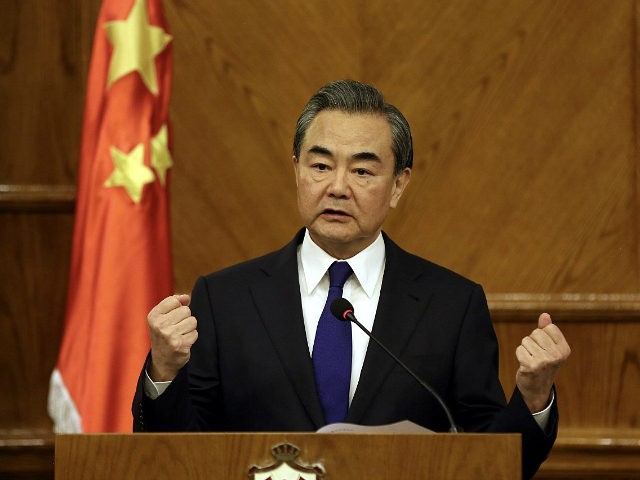Chinese state media reported Sunday that, during a conversation last week, Chinese Foreign Minister Wang Yi warned U.S. Secretary of State Mike Pompeo that Washington should not “go too far” in “actions that are harmful to Chinese interests.”
A State Department press announcement on the conversation did not provide any details, stating only that the two discussed “elements of the bilateral relationship” and their respective relationships with Iran.
Chinese government reports of Wang’s warning preceded typically bellicose columns in Chinese government newspapers encouraging President Donald Trump to cease adopting policies that curb illegal Chinese behavior, including the use of government-controlled technology corporations to spy on competitor governments and the use of agents in forced technology transfers and intellectual property theft.
“Chinese State Councilor and Foreign Minister Wang Yi urged the United States not to go too far in its damaging moves against Chinese interests in a phone conversation Saturday with U.S. Secretary of State Mike Pompeo,” state news service Xinhua reported on Sunday. “Noting that the U.S. side has recently made remarks and taken actions that are harmful to Chinese interests in various fields, including cracking down on Chinese enterprises’ normal operations through political measures, Wang said China strongly opposes such actions.”
Wang reportedly told Pompeo, “We urge the U.S. side not to go too far.”
Xinhua reported that Wang also objected to the Trump administration’s growing ties to Taiwan, a free sovereign state that China insists is its province despite having no legal political influence on the island. “Wang stressed that China has stated its firm opposition to the U.S. recent negative words and acts related to Taiwan” and urged the United States “handle Taiwan-related issues carefully and properly,” according to the outlet.
Aside from the threats, Xinhua claims that Wang used the typical language of the Chinese Communist Party (CCP) in encouraging Washington to work with China to “manage their differences on the basis of mutual respect, expand cooperation on the basis of mutual benefit, and work together in pushing forward a China-U.S. relationship based on coordination, cooperation and stability.” Xinhua did not provide specifics on what achieving these goals entails for Beijing.
The State Department did not address Wang’s aggressive statements in reporting on the call.
“Today, Secretary of State Michael R. Pompeo spoke with Chinese State Councilor and Foreign Minister Wang Yi. They discussed elements of the bilateral relationship, including U.S. concerns about Iran,” the State Department said.
China recently welcomed Iranian Foreign Minister Mohammed Javad Zarif to Beijing to discuss “recent developments,” according to Zarif. The foreign ministry recently concluded a small tour of east Asia seeking support amid new sanctions and a rising U.S. military presence in the Middle East.
Wang’s threats followed a heated month of May for trade talks between Washington and Beijing. The Trump administration raised tariffs on $200 billion worth of Chinese goods this month to 25 percent, imperiling their reach in the U.S. market, shortly after the conclusion of a working dinner discussion between Chinese and American officials. The Chinese communist regime responded by scheduling a tariff increase on U.S. goods to 25 percent for June 1.
Despite the acrimonious tenor of diplomatic talks, reports have surfaced that President Donald Trump may engage in talks with Chinese dictator Xi Jinping. Economic adviser Larry Kudlow told reporters last week that there was a “strong possibility” of such a meeting next month, when Trump is scheduled to travel to Japan.
In the meantime, Chinese state media has increased its attacks on America.
“The United States has once again resorted to bullying in its trade and economic relations with China. But the U.S. trick of exerting extreme pressure to deter China won’t work,” the People’s Daily, the official newspaper of the Communist Party, asserted on Monday. “These obstacles will only make China stronger. Its journey toward national rejuvenation is unstoppable.”
In another column signed “Zhong Sheng,” which the newspaper identifies as “pen name often used by People’s Daily to express its views on foreign policy,” the publication denied the existence of forced technology transfers, a practice rampant among Chinese technology companies to steal American intellectual property and compete in the world market. Forced technology transfers and intellectual property theft are high on the list of reasons the Trump administration has employed tariffs and demanded a restructuring of the trade relationship between America and China.
“The American companies are not forced to come to China with their technologies, nor could they be coerced to cooperate with their Chinese counterparts,” “Zhong Sheng” protested. “Scientific and technological achievements are in essence the work of mind, and nobody is able to manipulate the mind.”
The piece implied that accusations of property theft had racial undertones, claiming that some who object to forced technology transfers “turn a deaf ear to the fact that China’s technological progress comes from the hard work, wisdom, and creativity of the Chinese people.”
“Sticking to such mindset [sic], the US itself is becoming the laughing stock of the world,” the column concludes.

COMMENTS
Please let us know if you're having issues with commenting.